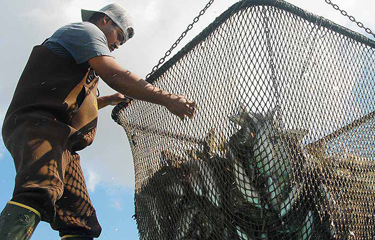Cargill’s aquafeed business is making great strides towards supporting more sustainable global aquaculture, according to its 2019 sustainability report, published this week.
Cargill, one of the largest feed companies globally, produces feed for salmon, shrimp, tilapia, and other marine species in 20 countries, supported by innovation centers in Chile, Norway and the U.S.
Cargill Aqua Nutrition President Pilar Cruz said collaboration is key to the company’s desire to deliver transformational change.
“Cargill’s purpose is to nourish the world in a safe, responsible, and sustainable way, and I believe that aquaculture plays a hugely important role in fulfilling this purpose,” Cruz said. “To achieve our goal, we ensure that sustainability is deeply embedded in our vision and the way we manage our operations.”
The report highlights how Cargill focuses on delivering animal health and welfare through feed and nutrition. The company also values training for farmers and workers, last year providing expert advice and support to more than 5,000 people in Thailand and Vietnam through local workshops and mobile lab services.
In 2019, the World Benchmarking Alliance, which benchmarks the 30 most influential companies in the seafood industry by measuring performance against progress towards meeting the United Nations Sustainable Development Goals, ranked Cargill aqua nutrition in sixth place.
“One of the most important things we achieved in 2019 was to move forward with our raw material sourcing, identifying more sustainable certified sources for marine ingredients and soy. For example, we use marine ingredients from MarinTrust certified suppliers, and our soy is grown to RTRS or ProTerra standards or is organic,” Cargill Sustainability Director Dave Robb told SeafoodSource.
“Cargill’s 2025 goal is to source all marine ingredients from sustainably-managed fisheries. To this end, we are working with fishery improvement projects Peru and Thailand to encourage greater uptake of FIPs,” he said.
As part of its push to expand the available basket of raw materials, Cargill has partnered with InnovaFeed, which uses by-products from one of its wheat processing mill to feed black soldier fly larvae. The project is proving so successful that production has already scaled up, enabling Cargill to supply feed containing insect meal to a major salmon farmer, according to the report.
“InnovaFeed will soon officially open its full scale 20,000-metric-ton production facility in France, and we look forward to supporting their growth,” Cruz said.
A further example cited in the report is Cargill’s collaboration with non-profit Technoserve, to help lupin farmers in Chile increase their productivity and profitability, and provide increased quantities of yellow lupins for incorporation into fish feed.
Cargill is a member of the Seafood Task Force, which seeks to improve conditions in the fishmeal supply chain, and joined the Global Salmon Initiative (GSI) project Salmón Social in Chile in 2019, helping to develop social and environmental codes of practice.
The company has also supported HATCH, the world’s first accelerator program for aquaculture start-ups, since 2018, with the aim of bridging the gap between breakthrough, innovative ideas and their commercialization, particularly for novel feed ingredients.
Photo courtesy of Cargill







